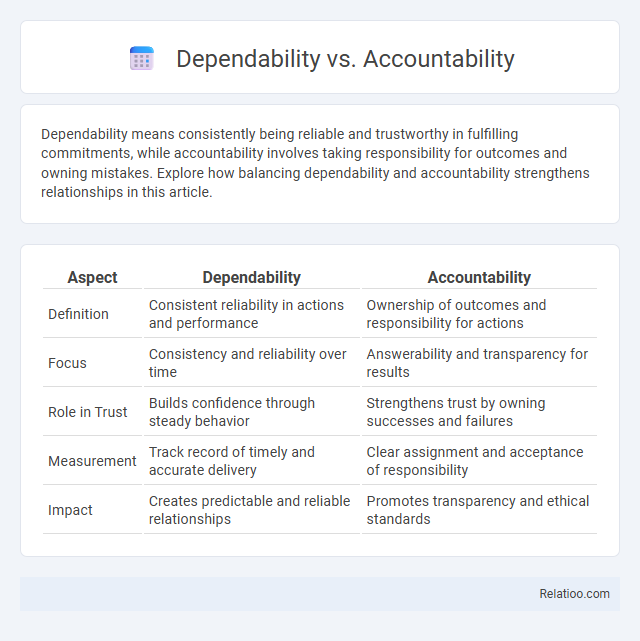Dependability means consistently being reliable and trustworthy in fulfilling commitments, while accountability involves taking responsibility for outcomes and owning mistakes. Explore how balancing dependability and accountability strengthens relationships in this article.
Table of Comparison
| Aspect | Dependability | Accountability |
|---|---|---|
| Definition | Consistent reliability in actions and performance | Ownership of outcomes and responsibility for actions |
| Focus | Consistency and reliability over time | Answerability and transparency for results |
| Role in Trust | Builds confidence through steady behavior | Strengthens trust by owning successes and failures |
| Measurement | Track record of timely and accurate delivery | Clear assignment and acceptance of responsibility |
| Impact | Creates predictable and reliable relationships | Promotes transparency and ethical standards |
Introduction to Dependability and Accountability
Dependability refers to the consistent ability to deliver reliable results and meet expectations over time, while accountability involves taking responsibility for actions and their outcomes. Both concepts are critical for building trust in professional and personal settings, as dependability ensures reliability and accountability guarantees ownership of tasks. Your success hinges on mastering these qualities to foster strong relationships and effective teamwork.
Defining Dependability in the Workplace
Dependability in the workplace refers to an employee's consistent reliability in completing tasks accurately and on time, ensuring smooth operational flow and trust among team members. Accountability emphasizes ownership of outcomes and willingness to accept responsibility for successes and failures, while responsibility involves assigned duties and obligations. Defining dependability centers on meeting commitments consistently, demonstrating punctuality, and maintaining high-quality performance without constant supervision.
Understanding Accountability: Key Concepts
Accountability involves accepting responsibility for actions and outcomes, emphasizing ownership and answerability in professional and personal contexts. Dependability refers to reliability and consistency in performance, ensuring tasks are completed on time and to standard. Understanding accountability requires recognizing the importance of transparent communication, proactive problem-solving, and the willingness to face consequences for decisions made.
Core Differences Between Dependability and Accountability
Dependability refers to the consistent reliability in performing tasks and meeting commitments, highlighting trustworthiness in actions over time. Accountability involves being answerable for outcomes and accepting responsibility for successes or failures, emphasizing ownership of results. The core difference lies in dependability focusing on consistent behavior and reliability, while accountability centers on the obligation to explain and justify decisions and actions.
The Importance of Dependability in Team Success
Dependability ensures your team consistently meets deadlines and delivers quality work, fostering trust and reliability among members. Accountability emphasizes owning responsibilities and outcomes, while responsibility involves assigned roles and duties; however, dependability drives steady progress by creating a dependable workflow. Teams with high dependability experience better collaboration, reduced conflicts, and increased overall success in achieving goals.
Why Accountability Matters in Professional Settings
Accountability in professional settings drives performance by establishing clear expectations and responsibility for outcomes, ensuring that team members are committed to their roles. Dependability reflects reliability in task completion, while accountability involves accepting ownership of results and consequences. Cultivating accountability enhances trust, facilitates decision-making, and fosters a culture of continuous improvement and ethical behavior within organizations.
Linking Dependability and Accountability for Optimal Performance
Dependability and accountability are closely linked concepts that drive optimal performance by ensuring reliable task completion and ownership of outcomes. Dependability reflects consistent reliability in meeting commitments, while accountability involves taking responsibility for results and learning from successes or failures. Integrating these traits fosters a culture where employees not only deliver on promises but also actively engage in problem-solving and continuous improvement.
Real-Life Examples: Dependability vs Accountability
Dependability means consistently showing up and completing tasks on time, such as an employee reliably meeting deadlines without reminders. Accountability involves taking ownership of outcomes, like a manager addressing a project's failure openly and learning from mistakes. You can build trust by being dependable in your duties and accountable for the results, demonstrating both reliability and responsibility in real-life scenarios.
Building a Culture of Dependability and Accountability
Building a culture of dependability and accountability requires establishing clear expectations, consistent communication, and fostering trust among team members. Dependability hinges on delivering reliable results and meeting commitments, while accountability involves taking ownership of actions and outcomes. Emphasizing transparency and constructive feedback strengthens both qualities, enabling a resilient and high-performing organizational environment.
Strategies to Enhance Both Dependability and Accountability
Strategies to enhance dependability and accountability include establishing clear expectations and consistent communication to build trust within teams. Implementing regular performance reviews and feedback sessions ensures responsibilities are met and fosters a culture of ownership. Utilizing project management tools and transparent reporting systems promotes timely task completion and accountability at every level.

Infographic: Dependability vs Accountability
 relatioo.com
relatioo.com